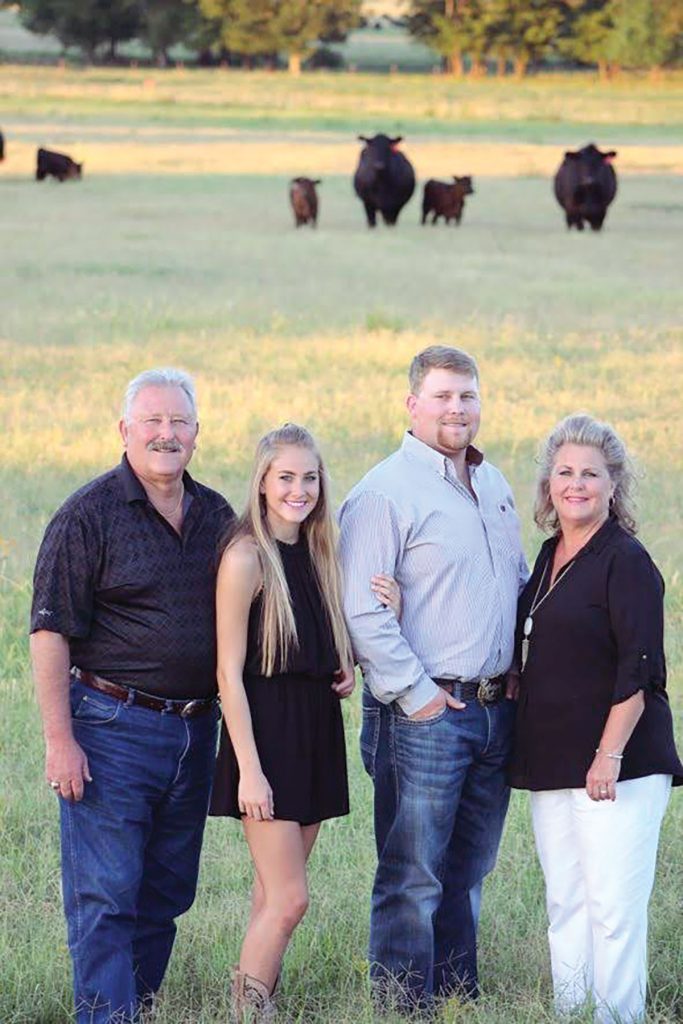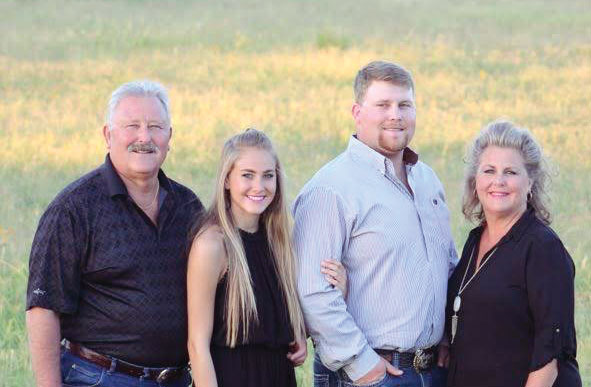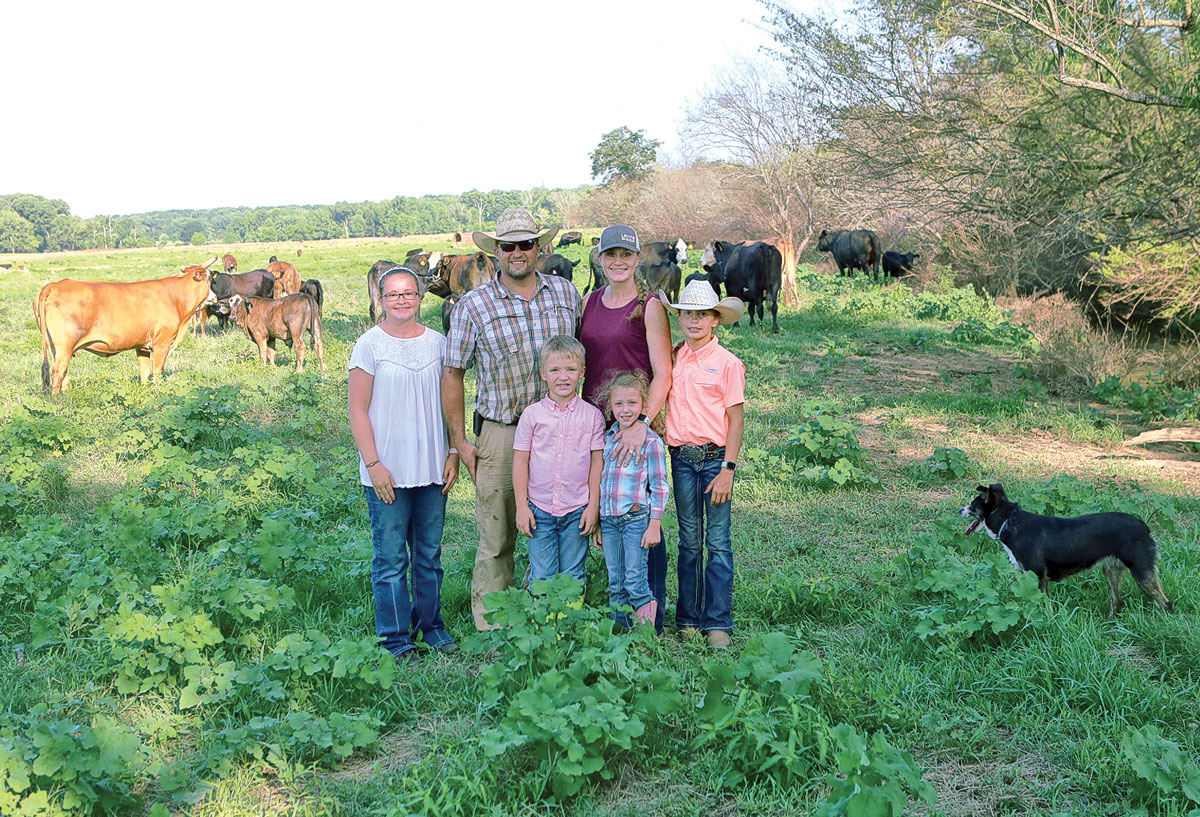
Jerry and Kathy Barnes never intended to start an Angus operation on their property
When Jerry and Kathy Barnes met in the early 1980s, they never pictured themselves married, living in Oklahoma, operating a registered Angus ranch and traveling across the country with two kids and a string of show cattle, but that’s what happened.
The initial idea wasn’t to start a ranch. Jerry was vice president for the Williams Companies in Tulsa and wanted to find a getaway near Grand Lake for four wheeling and other outdoor activities.
In 1997, the Barnes purchased 160 acres in Fairland, Okla., with contiguous land added later for a total of 300 acres. Diamond B Ranch was established in 1997 with a registered Angus herd for their maternal traits and cross-breeding diversity.
Over the next decade or so, Jerry continued improving the ranch and building his herd.
During high school, their son Jake became involved in FFA and exhibited cattle as his SAE project. His first show heifer was purchased at Express Ranch and her genetics are still found within the herd.
A natural outgrowth from that was their daughter Erin joining 4-H and both kids being very involved in exhibiting nationally from 2012 to 2018.
Some of their favorite shows were the Oklahoma State Fairs, the Oklahoma Youth Expo, the American Royal, the National Western Stock Show, the Houston Livestock Show, National Junior Angus shows, as well as shows in Kentucky and Pennsylvania.
With hard work and good advice, the ranch has produced high-quality show animals. In 2017, Jake won grand champion at the National Western Bull Sale Show in Denver with his bred and owned bull, DBR Take Notice. He was out of Jake’s first show heifer. Jake went on to sell Take Notice, while retaining semen rights. Many of Take Notice’s calves dot the ranch today.
When Jake and Erin went to college, competing on the show circuit stopped. Jerry retired in 2016 and managed the ranch mostly by himself, with help from his children. After earning a bachelor’s degree in agricultural leadership from Okalahoma State University, Jake returned to the ranch to work with his dad and serves his community as a fireman for a local fire department. His schedule of working two days and off four days makes possible an ongoing transition of ranch leadership with Jake gradually taking over. Erin is a senior at Oklahoma Univeristy, majoring in marketing, so her skills will be invaluable to Jake in the future.
After showing, the ranch has evolved into a more diverse breeding and show stock operation. Most calves are born in the spring with some born in the fall. Calves are weaned at seven months and then backgrounded 30 to 45 days before being sold off the ranch.
Jerry flushes the donors and transplants some of the embryos into Angus cattle to hopefully produce a few show heifers. He then uses a Hereford bull for cleanup and all black baldies are sold as replacement stock. In addition, he AIs some of the registered herd utilizing semen from Take Notice and other Angus bulls to produce replacements.
They sell a few bulls at Connors State College in Warner, Okla., through the school’s bull test. Additionally, for the past few years Express Ranch in Yukon has flushed some of the Barnes, donors (ex-show heifers) and sold their offspring in their annual show heifer sales. Recently, those donors have returned to the ranch to be flushed and their prodigy will be marketed off the ranch.
Diversity on the ranch also comes from breeding Angus heifers to a Wagyu bull. The result is relatively no birthing issues and highly-prized Wagyu/Angus meat sold off the ranch in quarters and halves.
With such high-quality stock, the ranch produces its own replacements at an average rate of 10 percent per year. The herd is young with an average age of 4 to 5 years old. Temperament is the most important reason for culling so customers can be assured of manageable animals, and any calf with an attitude is sold immediately at weaning. Cows are typically culled for udder or feet issues and bulls for age.
As is to be expected, different categories of animals are on different feeding regimens. Cows eat mostly grass and hay raised on the farm but receive supplemental protein tubs and/or cubes in the winter. Donors and show heifers are fed a show ration and, when a breeding bull is not in service, he receives a bull ration from Stillwater Milling.
Health protocols include a high-quality vaccination program combined with pour-on wormer in the spring and an injectable wormer in the fall. Flies are handled through Boss pour-on and alternated with a spray in addition to feeding a mineral with fly control. The most persistent health issue is foot rot which is treated as soon as it appears.
“This ranch began with 20 registered Angus cows and morphed into a very busy family cattle operation,” Jerry said. “Looking back, the decision to have an Angus based herd is now allowing multiple opportunities to market their prodigy. With Jake returning, there is a greater focus on selling show heifer prospects as well as marketing registered Angus and black baldy replacements, in addition to Wagyu/Angus beef.”







